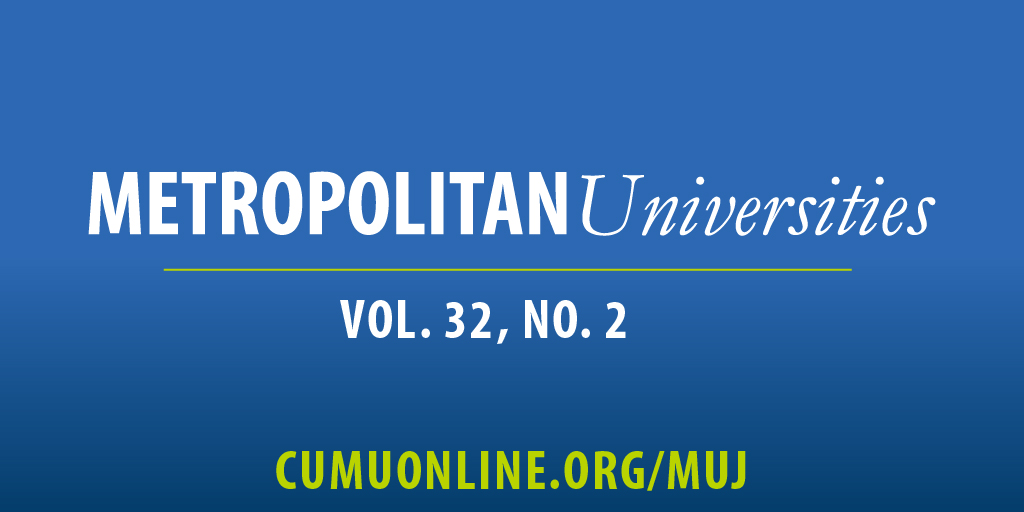Cultural Competency Activities
Impact on Student Success
DOI:
https://doi.org/10.18060/24536Keywords:
cultural centers, student affairs, career readiness, student developmentAbstract
This study examines the impact of a cultural center on students’ views and perceptions of their own cultural competency learning and ability to manage their college experience at a large metropolitan university. This exploratory analysis highlights the views of ten students who frequently engaged with a cultural center. Emerging themes include: (a) how students at a metropolitan university defined cultural competence; (b) challenges, difficulties, and problems participants experienced interacting with people from other cultures (e.g. nationality, ethnicity); and (c) successful interactions participants experienced with people from other cultures. Findings and discussion from this study suggest: (a) identity, exposure, and critical awareness; (b) navigating and negotiating conflict; and (c) engaging cultural resources are the skills students develop, through experiences with a cultural center, that impact their ability to manage their college experience. This project studied a culturally mixed group of students using personal experiences, interviews, and focus group discussions to describe meaningful and defining moments. This study and its findings are noteworthy because there is little research in this subject area. All participants were frank, cooperative, and candid throughout the process. They offered insights and shared information regarding cultural competency at Metropolitan University (MU).
References
ACPA: College Student Educators International & NASPA − Student Affairs Administrators in Higher Education (2015). ACPA/NASPA professional competency areas for student affairs practitioners. Washington, DC: Authors.
Allen, W. R., & Haniff, N. Z. (1991). Race, gender, and academic performance in U.S. higher education. In W. R. Allen, E. G. Epps, & N. Z. Haniff (Eds.), College in Black and White: African American students in predominantly White and in historically Black public universities (pp. 95–109). Albany, NY: State University of New York Press.
Astin, A.W. (1993). Diversity and multiculturalism on the campus: How are students affected? Change, 25(2), pp. 44-49.
Chun, E., & Evans, A. (2016). Rethinking cultural competence in higher education: An ecological framework for student development. ASHE Higher Education Report, 42(4), 7-162. doi:10.1002/aehe.20102
Council for the Advancement of Standards in Higher Education (2015). CAS learning and development outcomes. In J. B. Wells (Ed.), CAS professional standards for higher education (9th ed.). Washington, DC: Author.
Creswell, J. W. (2003). Research design: Qualitative, quantitative, and mixed methods approaches (2nd ed.). Thousand Oaks, CA: Sage Publications.
Creswell, J. W. (2013). Qualitative inquiry & research design: Choosing among five approaches. Los Angeles: Sage.
Glesne, C. (2011). Becoming qualitative researchers: An introduction (4th ed.). Boston, MA: Allyn & Bacon.
Hammer, M.R. (2009). The intercultural development inventory: An approach for assessing intercultural competence. In M.A. Moodian (Ed.), Contemporary leadership and intercultural competence: Exploring the cross – cultural dynamics within organizations. Thousand Oaks, CA: Sage.
Hammer, M. R. (2013). A resource guide for effectively using the intercultural development inventory (IDI). Berlin: IDI, LLC. Retrieved from http://idiinventory.com/wp-content/uploads/2014/08/Intercultural%20Development%20Inventory%20Resource%20Guide1.pdf
Harper, S. R. (2009). Niggers no more: A critical race counternarrative on Black male student achievement at predominantly White colleges and universities. International Journal of Qualitative Studies In Education, 22(6), 697–712.
Jenkins, T. S. (2017, May). A New Set of Standards for Multicultural Affairs: Transformative Education Principles & the Student Affairs Program Review. Paper presented at the National Conference on Race & Ethnicity, Ft. Worth, Texas.
Jenkins, T. S. (2010). Viewing cultural practice through a lens of innovation and intentionality: Strategies for student personnel administrators in culture centers. In L. D. Patton (Ed.), Culture centers in higher education: Perspectives on identity, theory, and practice. (1st ed.). Sterling, VA: Stylus Publishing.
Jenkins, T. S. (2008). In practice: The five‐point plan: A practical framework for campus cultural centers. About Campus, 13: 25-28. doi:10.1002/abc.249
McCoy, D. L. (2011). Multicultural student services at public institutions. In Stewart, D. L. (Ed.). Multicultural student services on campus: Building bridges, re-visioning community. ACPA, College Student Educators International. Sterling, VA: Stylus Publishing.
NASPA/ACPA (2004). Learning reconsidered: A campus-wide focus on the student experience. Washington, DC: National Association of Student Personnel Administrators and the American College Personnel Association.
Robertson, R. V., & Mason, D. (2008). What works? A qualitative examination of the factors related to the academic success of African American males at a predominantly White college in the south. Challenge: A Journal of African American Studies, 14(2), 67–89.
National Education Association (n.d.). Diversity toolkit: Cultural Competence for educators. Retrieved from http://www.nea.org/tools/30402.htm
Patton, L. D. (Ed.) (2010). Culture centers in higher education: Perspectives on identity, theory, and practice. Sterling, VA: Stylus Publishing.
Patton, L. D. & Hannon, M.D. (2008). Collaboration for cultural programming: Engaging culture centers, multicultural affairs, and student activities offices as partners. In Harper, S. R. (Ed.), Creating inclusive campus environments for cross cultural learning and student engagement. Washington, DC: NASPA - Student Affairs Administrators in Higher Education.
Sandeen, A. & Barr, M.J. (2006). Critical issues for student affairs: Challenges and opportunities. San Francisco, CA: Jossey-Bass.
Villalpando, O. (2002). The impact of diversity and multiculturalism on all students: Findings from a national study. NASPA Journal, 40(1), pp. 124-144.
Tinto, V. (2017). Reflections on student persistence. Student Success, 8(2), pp. 1-8. doi:10.5204/ssj.v8i2.376
Wolcott, H. F. (1994). Transforming qualitative data: Description, analysis, and interpretation. Thousand Oaks, CA: Sage Publications.
Downloads
Published
Versions
- 2021-11-11 (2)
- 2021-08-09 (1)
Issue
Section
License
Copyright (c) 2021 Jeffrey Coleman, Darryl Holloman, Melanie Turner-Harper, Christina M. Wan

This work is licensed under a Creative Commons Attribution 4.0 International License.



